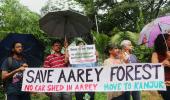'If the authorities go about completing this project the way they have proposed, this is going to cause a HUGE environmental impact not only on Malabar Hill but also on the rest of the city.'
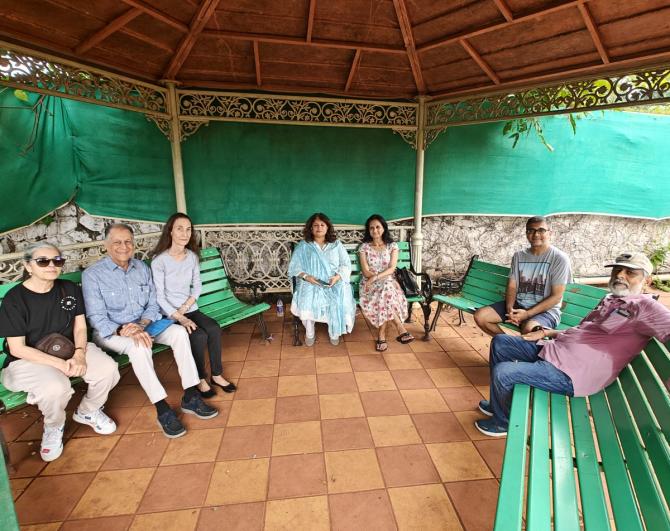
For the last few weeks, residents of Malabar Hill in south Mumbai have been protesting the construction of a water reservoir on the hill.
The news reports have highlighted only the campaign to save Pherozeshah Mehta Garden, better known as Hanging Gardens.
Neeta Kolhatkar spoke to Khorshed Bharucha, Kavas Petigara , Paula Petigara, Susieben Shah, general secretary, Malabar Hill Citizens Forum, which maintains the Priyadarshani Park and Sports Complex, Pervin Sanghavi, Khushbu Ghia, Jay Bhatia and Dr Nilesh Baxi about why residents of Malabar Hill, one of the city's most affluent areas, are so agitated about the BrihanMumbai Muncipal Corporation's plans.
Based on some sketchy information given to the residents, the augmentation of the water reservoir at Malabar Hill entails the following: 1. Construct a new reservoir of 91 million litres, which will occupy over 26,200 square metres, adjacent to Hanging Gardens and later fully construct and enhance the old Malabar Hill reservoir under Hanging Garden, which has the capacity of 147 million litres.
Finally, there will be 2 reservoirs with a capacity of 250 million litres.
The BMC has informed the residents, that the project is likely to be completed within seven years and will cost approximately Rs 400 crores (Rs 4 billion).
The residents allege that no project reports have been given to them or copies of any studies conducted to assess whether the hill can withstand the construction work and drilling that has been proposed.
There have already been two landslides on Malabar Hill in 2020 and the ecosystem is fragile.
The residents, who have come together to demand that the project be shifted to alternate sites, brush aside the narrative being put out against them as privileged citizens who want to hold onto a garden.
They are fighting to save the surviving green woods and lungs of this part of south Mumbai, they say, apart from highlighting that the hill has become precarious and that endangers everyone's lives.
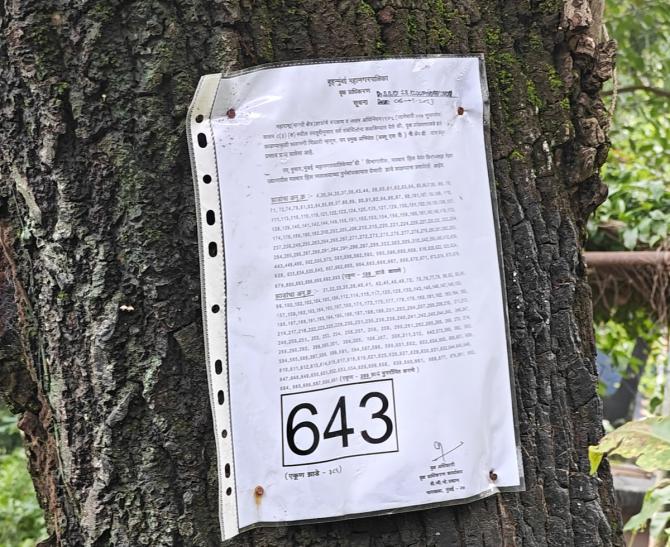
When did you first learn about the reservoir expansion plans? Were you officially informed about the chopping of trees and the municipal authorities taking over the Pherozeshah Mehta Garden, known as the Hanging Gardens?
Khorshed Bharucha: Two years ago a friend and resident of this area sent me a WhatsApp message on our ALM chat.
She showed it to me and I said it may not be true because the authorities won't just dig up an entire garden. That was the first seed of doubt.
Later I read in the newspaper a snippet and that was it.
Three weeks ago when I came walking, I saw the white papers put up for felling trees, and that is when the alarm bells rang.
Pervin Sanghavi: In March I read an article in a newspaper.
I called up the journalist to ask for more details. She said she had only that information stating 389 trees were to be felled for this project.
I went to the (BMC's) D ward office for more information and ever since March, I have been making the rounds to the water supply office and the D ward, but I'm unable to get more information.
It is now evident that some kind of work is happening. We did some research on Google and we saw, that the authorities have been planting stories since 2018, that tenders are being floated, this project work is on track. So maybe they had been planning for this project since 2017-2018.
Paula Petigara: We heard it around 2020 when the garden was being closed off and on.
Rumours were floating that it is going to be repaired, but nobody informed us about when or how.
Kavas Petigara: Authorities said they had shut the garden due to COVID-19 and they were not going to open.
So over a period of time some information was trickling in about the proposed takeover of this garden. Why did it take you all so long to come together?
Kavas: It has taken long because everything that one heard was just snippets from the media and hearsay from various residents.
Nothing was announced by the municipal corporation or any notices issued to us residents.
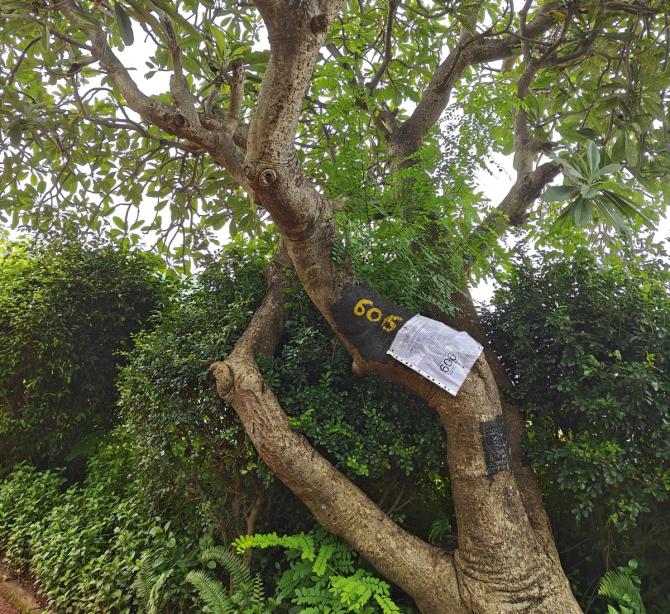
Do you think, had you all come together earlier, you could have been better prepared with the paperwork and information that you are struggling to get now?
Kavas: No, I don't think so. It is difficult enough right now when we are demanding we get the documents and all information with chronology since the citizens' movement.
We've not been getting the documents we want. There is no way the authorities would have given us any information or documents earlier.
They have been stalling and finally, we got a few documents due to our agitation.
Susieben Shah: You see, unless and until the orders were issued and a proper plan was envisaged, had we organised and agitated earlier, it would have been in the realm of make-believe.
You see, for all of us to imagine the municipal authorities would chop down nearly 400 trees, was impossible.
Why? Haven't you seen how for every project they have chopped trees and when citizens at Churchgate and at Aarey protested they were called anti-national, anti-development and Urban Naxals?
Susieben: We always believed the Shantivan and this entire area was a heritage precinct. Who would have thought they will chop 400 trees in this heritage area?
Pervin: There was no news of the trees being cut, that too we learned of when the municipal officials communicated with one newspaper journalist.
See, again, they are only communicating with a few media and they are not meeting us, communicating or having any consultations with us residents. We have not been told that work has started.
Khorshed: Now, at all times we were given to believe there was renovation of this particular garden.
At no time were we informed that they are building an additional reservoir to augment the water supply.
May I point out, as a group, that we are not objecting to the augmentation of water supply for South Mumbai.
It is needed, undoubtedly. We are objecting that it is being done at this particular site.
Earlier, there was precedence in the BMC of calling for a public hearing, prior to any project being launched. The officials would listen to the residents of that particular locality and take their suggestions. Was it bypassed in this particular case?
Susieben: It is absolutely incumbent upon the administration and government to have a public hearing, especially in the case of an environmental issue and where so many trees are to be cut down.
It is not an issue only about trees. The main concern is of the biodiversity of this area.
It is incumbent upon them as per the municipal law and they have just ignored it.
These bureaucrats come and go every five years, while all of us residents have been living here for over three generations.
These bureaucrats take upon themselves these projects like their personal missions, not understanding the topography, biodiversity and the huge impact it will have on all our lives.
Jay Bhatia: See, public hearing is mandatory and it wasn't called for earlier.
Everything that is being done is an eyewash and keeping everything in the private domain.
All the documents, plans and proposals have to be put out in the public domain, which they haven't done.
Moreover, decisions can be made only after inviting suggestions and feedback from the public and especially the residents.
Nothing of this sort has happened in this case. They have not conducted studies or called on experts to assess alternate options and plans.
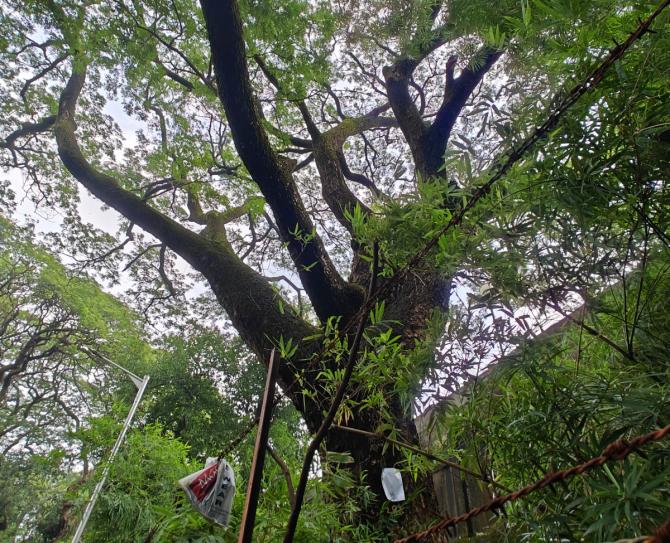
What do you have to say to the allegations made against residents of Malabar Hill -- you all are being termed as tree-hugging activists with vested interests? You are accused of missing the larger picture.
Kavas: This is an extremely wrong impression that is being put out through the media because we all agree the general public needs water.
There are a great number of people in our South Mumbai who do not get sufficient water, let alone the buildings here that are rich enough to get tankers.
So there is a huge water supply problem. There is no doubt a water augmentation project is needed.
Sadly, the media seems to have got it wrong. This issue is far more than a tree-hugging exercise.
If the authorities go about completing this project the way they have proposed, this is going to cause a HUGE environmental impact not only on Malabar Hill but also on the rest of the city.
With all the vegetation and trees being cut, the entire eco and micro systems will get impacted.
When this project gets underway, we speak of pollution in the cities and a huge proportion of that is primarily contributed by construction work.
Automobile and chemical pollution is lower than construction work pollution.
The second point is the authorities have brushed aside the safety norms.
They have been stating this reservoir has bulges in the pillars, it has leakages and problems; anytime it can collapse and there will be a greater disaster.
But wait have they done any geological survey of Malabar Hill before undertaking any such expansion project? And not using some local consultant, but some renowned Himalaya institutes.
Or for that matter, have they taken the opinion of an arborist before going ahead and chopping the trees? The key issue is, that this has not been done.
It is just hearsay that someone conducted a study in 2017 and another study was done for the coastal road, is what they have told us.
These issues are being left out by the media and the general public is getting an impression that the residents of Malabar Hill are upset that their garden is being taken away and they won't be able to have their nice morning and evening walks.
Did you all know the Hanging Gardens was under a heritage precinct? When did you learn it was removed? Do you think it was deliberately removed?
Khorshed: I had no idea that it had been removed as a heritage site.
When we had the first meeting with a few BMC officials outside the gates of Hanging Gardens, we told them to take us on a recce on what they were planning.
At that time I told them this is a heritage precinct, so how do they propose to go ahead? Did they have any permission from the heritage committee that they could chop trees and take the garden? They didn't reply and I didn't know then it was no longer a heritage site.
Nilesh Baxi: It was a heritage site till 1995 and we recently learned that the tag was removed.
For so many years this information was kept back from us residents.
Only recently when we went to the D ward to get information did we learn the tag was removed.
Pervin: Like Susieben said a while ago, the bureaucrats are transferred every five years. But their decisions and important information regarding the city have to be put in the public domain.
Now this information should have been put on their Web site, which was not done.
We were not aware till recently about the removal of the heritage site tag.
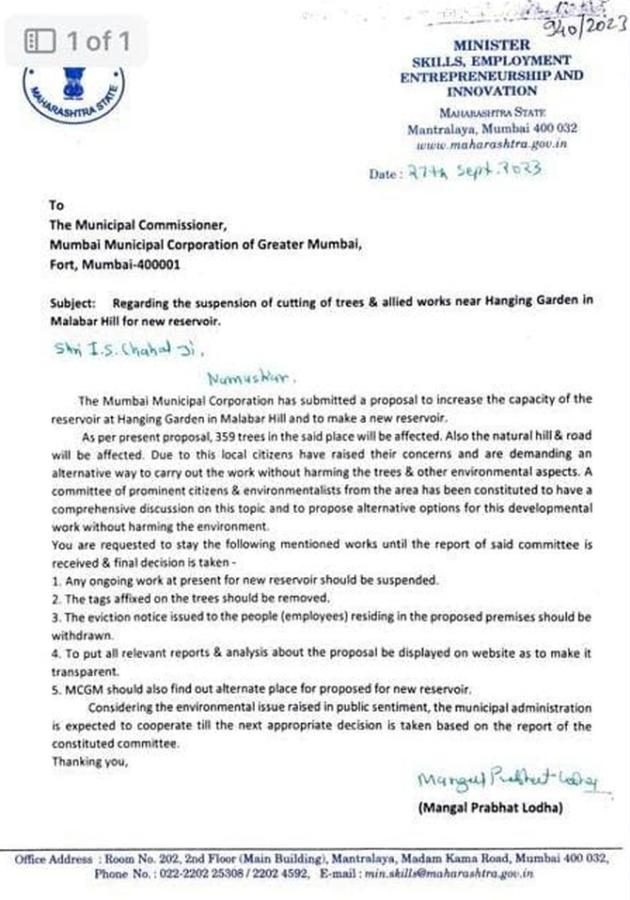
Do you feel there is a lack of transparency and information is not being shared with the public?
Kavas: It is not only a lack of transparency, it is a deliberate attempt to keep information away from us. It can only be that.
One of the members of our group pointed out how a similar repair to another reservoir at Dockyard Road was done and all information was shared with the residents, their views were taken and it was done in a completely transparent manner.
The average citizen like us doesn't think all of these details from before.
It is when something is about to happen to a beloved area,is when we pursue minute details.
Susieben: See, everyone has a role cut out for them. We as citizens depend on our elected representatives to address the issues and follow up with the bureaucrats.
We would expect the guardian minister to interact with the residents and take up their issues.
Is that happening is a question? We aren't the watchdogs, the local representatives and bureaucrats are supposed to do that.
Our elected representatives are not acting in the best interests of the people.
Khorshed: I met the superintendent for gardens and trees and asked him as a custodian of trees how could he permit to chop 389 trees? He received orders right from the top office and he was asked to sign. Such a person is expected to be the protector of our environment.
Malabar Hill experienced two landslides in 2020 and one road caved in. Do you think this hill has become fragile and any more construction or digging could cause further damage?
Khushbu Ghia: If they want to augment the water supply, they can look for alternate places. Why do they want to undertake such a project by cutting down a semi-forest area? We have suggested several places.
It is still not clear whether it is a rock surface or cement covering.
Earlier BMC said it was damaged and around the time before launching the coastal road, they said the reservoir cover was fine.
Kavas: This is a hint, that maybe all is not well with the hill and we should not tamper with it by undertaking such a huge project.
It would have been another story if was there an organisation that we could all trust and believe were they to go ahead with construction. But that is not the case.
Khorshed: The BMC hasn't even informed residents of Godrej Baug, Mehrina, Simla House and near Shantivan that a project is being proposed and there will be huge problems of accessibility and they are likely to be affected. They haven't been informed by the authorities.
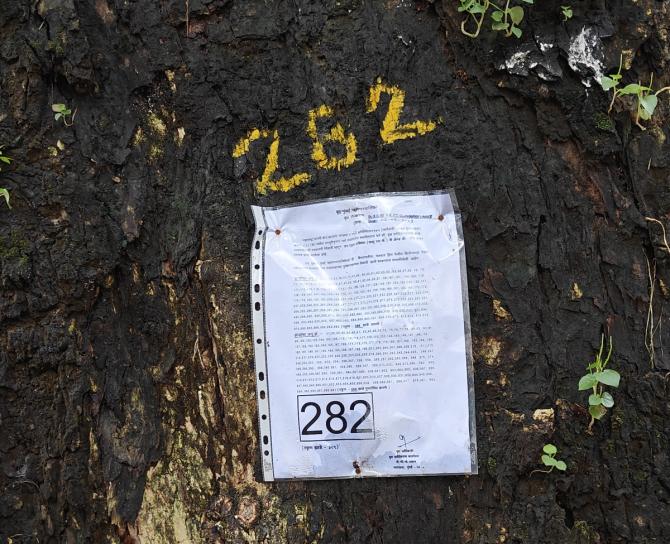
Do you feel there is a strong trust deficit?
Kavas: The term of the corporation expired 18 months ago.
If we did have a Corporation then there may have been a democratic discussion in the Corporation on this particular project.
Right now they are doing by fiat, by a diktat. There is nobody to contradict or strike it down in the Corporation. This is a crucial issue we are facing.
Susieben: Yes, our corporators are not there in BMC and now the urban development ministry is handling civic issues.
As a result, discussions couldn't be held. The BMC is being run by the government.
Speaking of augmenting supply, with more high rises being planned, there has been a huge water problem in south Mumbai in the last few years. Another accusation against your protests is it will impact this plan and you all are privileged citizens.
Jay: Malabar Hill citizens are not privileged, we too have a water shortage.
Many buildings call for tankers and we face many problems at the local level.
We have huge traffic problems, movement of vehicles and other civic problems apart from the shortage of water supply.
Pervin: A lot of high rises have been planned and many have been constructed.
BMC had made it mandatory for every builder to implement rainwater harvesting and compost pits, which they have to show in their plans before getting approvals.
Moreover, shouldn't the civic authority pan for augmentation before approving these high rises? They need to plan for civic infrastructure and augmentation of water supply before giving the approvals for building a skyscraper.
Khushbu: They should plan for augmentation, but construct elsewhere. Spare the hill. It is already fragile. It will impact our entire ecosystem.
Kavas: Basically have two types of water supply systems.
One is if there are hills, you get water from the reservoirs, one way or another from the water catchment areas.
Then with force of gravity water is taken to the doorstep of every home.
That is the way the Malabar Hill reservoir works for the 11 regions of south Mumbai.
The second way to do, which most modern cities have, is the pressurised water system right from the source to the doorstep, under 24-hour pressure.
That is why in other international cities like New York and London, you can drink tap water. Because the pipes are essentially sealed, the water is purified at the source and it ends up at homes, still pure.
By any kind of engineering standards, the BMC is undertaking a humongous project.
For an engineer like me it gets my adrenalin running. They should make way for a pressurised water system, which they will eventually have to do.
The officials say they can't do that because the pipes are leaky and old. Now, if as per their estimate the project is completed in seven years, their pipes may be in such pathetic condition that they will be compelled to change the pipes and on top they will spend twice the amount of money. They need to find an alternative.
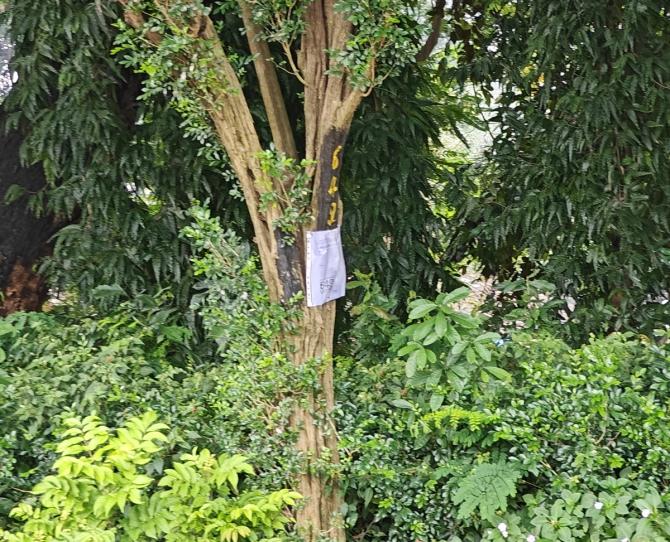
Do you think this is a conspiracy?
Kavas: It is an easy way out with a lovely huge project.
An alternative reservoir at the ground level is not going to supply water to the city by gravity which is what the municipality wants to do. It is an eyewash.
Khorshed: Earlier the reservoir survived for 150 years, so I asked the engineer for how long the new one last? He said till at least 2050.
Imagine such a huge project is being undertaken at such a high cost with huge ecological damage and it will last for only 25 years.
Pervin: Because earlier it was made by the British and this will be made by the BMC. That is the difference.
What is the alternative?
Kavas: There is one, like the typical Indian jugaad system.
Currently, water is pumped from the Bhandup pumping station (in north east Mumbai) to the Shantivan garden (in Malabar Hill) and from there is it pumped at a distance of a few hundred metres into the Malabar Hill reservoir.
Here water is stored and from there, it is released to the outlet pipes by gravity.
We have competent hydraulic engineers who can devise a system to pump water from Shantivan directly to the Malabar Hill reservoir's outlet and water can be supplied to south Mumbai by gravity and there will be no need to store water in the Malabar Hill reservoir.
This work can be completed in few months and not take seven years, in addition to cutting down on costs.
Nilesh: One additional municipal commissioner commented this project is like operating on living human beings.
I gave him an example of how heart surgeries were conducted earlier.
They would use a heart-lung machine, wherein all the blood was passed on to that machine and it would perform the function of a heart till the surgery was completed.
In the same way, as he suggested, in this garden, there are 20 vents to go down to the tanks.
The main reservoir which is created on the reclaimed land at Priyadarshini Park, the water has to be pumped to reservoir number one only because all pipes are different.
They can go down the vent and repair reservoir one to check if the repairs are successful.
They will need to augment this water storage, as the capacity is not sufficient even today.
Both the suggestions made by Kavas and me are viable and can be checked before embarking on such a gigantic project.
Also, the authorities now need to strictly implement the 2001 law, of making water harvesting mandatory before sanctioning any new project, unfortunately, it is not being done.
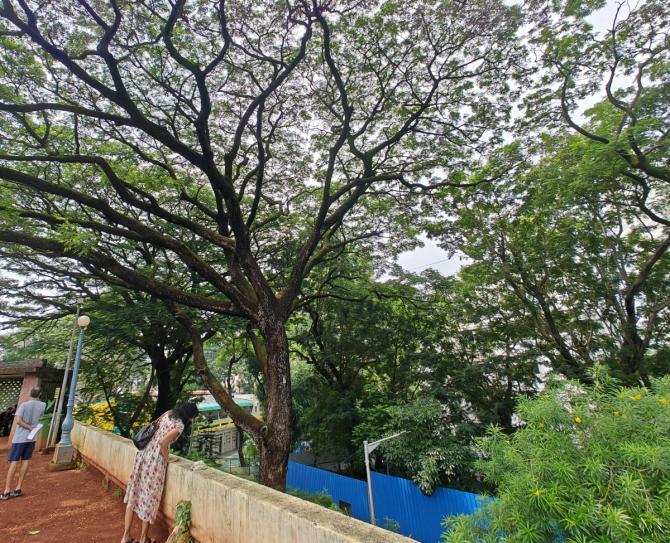
Is there is a wrong narrative being put out about the reservoir likely to burst just when your protests have intensified?
Khorshed: It was irresponsible of BMC to frighten people through the media. They said there is a possibility of this huge disaster.
Pervin: It is like what happened during the Aarey protests.
The protests would stop a commuter from using the metro.
On the same lines they are putting the onus on us residents protesting. This tank may burst any time. We are not against the repairs at all.
Nilesh: The agencies have constructed two tunnels for the coastal road just below this reservoir and their studies allowed them to go ahead.
They couldn't have gone ahead to construct this tunnel had they not conducted studies to assess whether the reservoir would withstand the pressure and drilling.
Huge tunnel boring machines were deployed, there was a lot of blasting that has occurred below and the tank has not been damaged.
If it was precarious, then they should have created an alternative infrastructure many years before, why now?
I am a tree man and I will tell you, giving BMC the responsibility to transplant any tree is a sure death warrant for the trees. They have not been successful.
Second point, if they want to transplant, why take it 30 kilometres away.
They are local trees, transplanted in them within this locality.
Do the residents here not deserve the tree cover? They are the lungs of this area. The trees they want to cut are over 90-100 years old.
Pervin: This entire narrative of shifting the focus of these protests from the Malabar Hill woods of our area to only Hanging Gardens.
We are against the felling of these old trees which is the semi-forest area of the entire Malabar Hill area.
We saw the notices put up on these old beautiful trees right down till Shantivan.
Jay: Yes, it this narrative being put out that our protests are about Hanging Gardens or the citizens are against the garden being taken by the corporation.
We are not obsessed with the garden. It is about the hill as Pervin is saying.
The ecosystem around it, the flora, fauna and bio-diversity around the entire Malabar Hill forest area.
As we go down Ridge road, one can see the changes in our biodiversity after the landslide. We don't need another disaster to take place here.
Kavas: The environmental impact of 7-9 years over here of construction is going to be severe.
The high amount of dust, cement debris, trucks taking the debris out, bringing the construction material, the noise and the huge amount of traffic congestion we will face.
Khushbu: We have seen in the north the impact of infrastructural projects on the mountains there.
We have seen what happened to Joshimath now here. Why are they messing with the hill again? It is common sense.
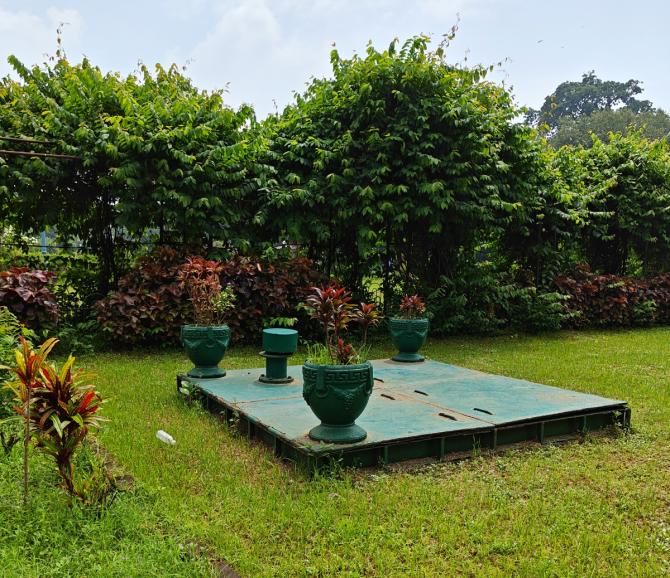
Would you all take the legal course and are you prepared for that?
Jay: Eventually, as a last resort if at all. We need the cooperation of the various departments that are undertaking this project.
If it does not go through the cooperative method then the only last route we citizens have are the courts to seek legal remedy.
Nilesh: Yes, in a few previous cases, like I was involved in the case to save the trees that were cut for the coastal road project, we approached the high court and Supreme Court and we lost.
The Parsi agiary at Marine Lines lost their case.
See, if we go the legal way, then all our sources to get documents and information will dry up.
Jay: Again authorities put out their narrative which is only infrastructure and they are doing the infrastructure for the larger part of the public good.
Hence, it is a public cause for the administration than for the citizens.
Feature Presentation: Rajesh Alva/Rediff.com


